by Naomi L. | October 19, 2016 | Blog, Creative Writing |
Remember that list of 20 sets of homonyms I shared a year ago, or that list of 25 sets of easily confused words I shared last month? Maybe you haven’t been reading my blog for that long, but if you do recall reading them, you may appreciate the overlap of their themes in today’s creative writing post. The Error Avoidance game in the Elevate – Brain Training app includes several pairs of homophones – so many, in fact, that instead of including them in the aforementioned list of commonly confused words, I saved them to add to another list of homonyms. The English language has so many, it’s hard to keep track!
So on that note, here’s a list of 32 more pairs and sets of homonyms to watch out for in your writing. Enjoy!
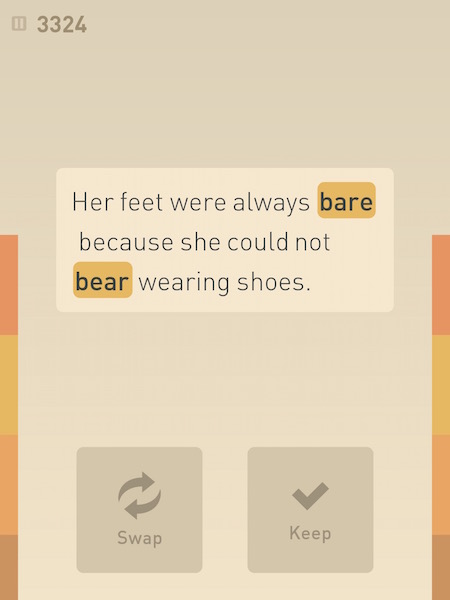 1) Bail / Bale – “Bail” is the temporary release of an accused person awaiting trial. A “bale” is a tightly wrapped bundle of a material, such as hay or cotton.
1) Bail / Bale – “Bail” is the temporary release of an accused person awaiting trial. A “bale” is a tightly wrapped bundle of a material, such as hay or cotton.
2) Bare / Bear – To be “bare” is to be uncovered. To “bear” is to carry, support, or endure.
3) Baited / Bated – To be “baited” is to be prepared with a lure or to give in to a taunt. To be “bated” is to be in great suspense.
4) Bow / Bough – To “bow” is to bend the head or upper part of the body. A “bough” is a main branch of a tree.
5) Canvas / Canvass – A “canvas” is a type of strong, coarse cloth. To “canvass” is to solicit votes from electors.
6) Cite / Sight / Site – To “cite” a passage from a book or author is to quote it as evidence for a statement. A “sight” is anything that one sees or that can be seen. A “site” is an area where a building is constructed or where an event occurs.
7) Creak / Creek – To “creak” is to make a high-pitched sound when being moved. A “creek” is a stream or brook.
8) Doe / Dough – A “doe” is a female deer. “Dough” is a mix of flour and liquid used for baking.
9) Fair / Fare – To be “fair” is to be in accordance with the rules, while a “fair” is a gathering of amusements for public entertainment. A “fare” is the money a passenger has to pay for public transportation, while to “fare” is to perform in a specified way.
10) Faze / Phase – To “faze” someone is to disturb or disconcert them. A “phase” is a distinct period or stage in a process.
11) Flair / Flare – “Flair” is a special ability for doing something well. A “flare” is a burst of bright light or flame.
12) Floe / Flow – A “floe” is a sheet of floating ice. To “flow” is to steadily move along in a continuous stream.
13) Foreword / Forward – A “foreword” is a short introduction to a book. “Forward” is toward the front or future.
14) Gored / Gourd – “Gored” is the past tense of “gore”, which means to pierce or stab. A “gourd” is a large fleshy fruit or a drinking container.
15) Hail / Hale – “Hail” is frozen rain. To be “hale” is to be strong and healthy.
16) Hangar / Hanger – A “hangar” is a building for housing an aircraft. A “hanger” is an item that holds clothes.
17) Hawk / Hock – A “hawk” is a bird of prey, while to “hawk” is to peddle goods. To “hock” is to pawn one’s possessions, while a “hock” is a cut of meat.
18) Hew / Hue – To “hew” is to chop or cut. A “hue” is a color or shade.
19) Hoard / Horde – To “hoard” is to amass money or valuable items and store them away. A “horde” is a large group of people.
20) Lightening / Lightning – “Lightening” is the act of making something lighter. “Lightning” is an electrical weather phenomenon.
21) Loath / Loathe – To be “loath” is to be reluctant or unwilling. To “loathe” is to hate or despise.
22) Pail / Pale – A “pail” is a bucket. To be “pale” is to be light in color or to seem less important.
23) Pair / Pare – A “pair” is a set of two. To “pare” is to trim away the outer edges of something.
24) Palate / Palette / Pallet – A “palate” is a person’s appreciation of taste and flavor. A “palette” is a range of colors used by an artist. A “pallet” is a portable platform used for moving, stacking, and storing goods.
25) Peal / Peel – To “peal” is to ring loudly. To “peel” is to remove an outer layer.
26) Premier / Premiere – To be “premier” is to be first in importance. A “premiere” is the first performance or showing of a theatrical work or movie.
27) Raise / Raze – To “raise” is to lift up. To “raze” is to destroy completely.
28) Reek / Wreak – To “reek” is to smell strongly and unpleasantly. To “wreak” is to inflict or cause a large amount of damage.
29) Sear / Seer / Sere – To “sear” is to burn or scorch the surface of something. A “seer” is a person who supposedly is able to see what the future holds. To be “sere” is to be dry or withered.
30) Succor / Sucker – “Succor” is a form of assistance and support. A “sucker” is a lollipop or a gullible person.
31) Vice / Vise – A “vice” is a moral flaw. A “vise” is a device that holds an object in place.
32) Warrantee / Warranty – A “warrantee” is a person to whom a guarantee is given. A “warranty” is a written guarantee promising to repair or replace a purchase if necessary.
Have you ever mixed up these words before? What other pairs or sets of homonyms would you add to this list?
by Naomi L. | October 12, 2016 | Blog, Creative Writing, Featured |
Yes, I know I’ve been writing a lot about my recent graduate school achievement lately and it might be getting tiresome to my regular readers. Don’t worry; I promise it’ll only go on for like, two more months (just kidding!). In all seriousness, though, my Master’s thesis did teach me a lot about writing, as much in science as in general, and since it’s been such an insightful experience, I thought it would be fun to share what I learned on my creative writing blog.
So on that note, here are five lessons I learned from writing my Master’s thesis. Enjoy!
1) A thesis will never, ever be perfect. Ever.
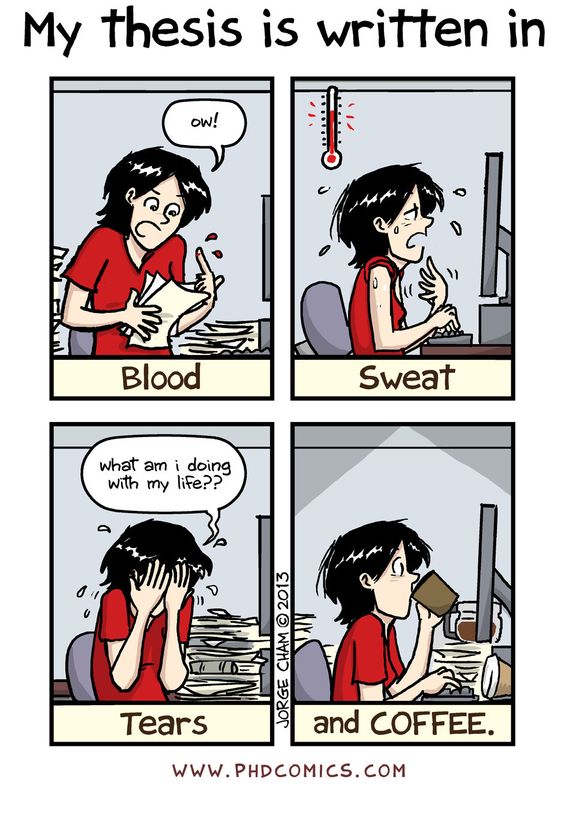
“Piled Higher and Deeper” by Jorge Cham
www.phdcomics.com
This point is worth mentioning first as it applies to all types of writing. Seasoned writers all know that a huge part of writing is rewriting, and that arguably holds true for nonfiction more than any other genre. One of the most important lessons I learned through my years in college and grad school is that scientists can’t hope to turn out quality papers and articles without rigorous research and engaging discussions of their results, but the challenge of writing about science is that science is constantly changing. New research is being published every day and new ideas are emerging every hour, making it nearly impossible to keep drafts of a paper or thesis updated to the minute.
But an endless stream of new research isn’t the only challenge of academic writing. Perfectionism has long been a barrier to productivity, as any writer with a strong inner critic can attest. You can strive to cite every relevant reference, cover every possible discussion point, and smooth out every error to the tiniest misplaced comma, but at some point you just have to accept that your paper/article/thesis will never be flawless by the time you submit it for publication. Don’t sweat it; that’s what editors are paid for!
Writing my thesis definitely pushed my limits in academic literacy and technical perfectionism. Tackling both these obstacles every day, it’s a wonder I ever even finished the first draft!
2) Scientific writing is not the same as literary writing.
Most of my writing takes the form of stories and poetry, which presented a challenge for me when it came to writing the main chapter of my thesis. Despite constant reminders to myself of the differences between scientific and literary composition, more than once I found myself falling into old creative writing habits, including, but not limited to:
- omitting important explanations in the introduction,
- using layman’s terms in place of scientific terms,
- lampshading flaws and shortcomings in the study (yes, really), and
- building suspense to the “grand reveal” of my results (which I still think was justified given that I discovered we were dealing with a different species than we initially thought).
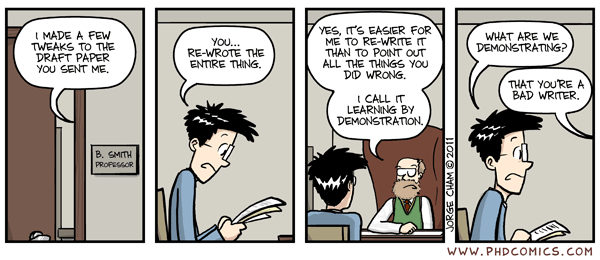
“Piled Higher and Deeper” by Jorge Cham
www.phdcomics.com
Honestly, my artistic side wants to turn everything I learned throughout my Master’s program into a novel, but my scientific side insists on being reasonable (i.e. following my professor and colleagues’ directions) and sticking to hard facts and logical discussions without embellishing the text with my storytelling voice. If this whole endeavor wasn’t challenging enough to begin with, these dueling voices in my head made the final stretch one heck of a ride!
3) Between the time you start your thesis and the time you defend it, your project will change at least a dozen times.
And if you’re lucky, that’s the most it will change. I was accepted into my Master’s program with a proposal for a phylogeographic study of four reef fish species spanning the Atlantic Ocean. By the time I defended my thesis, the project had been narrowed down to one species in Brazil, which later turned into a study of the entire genus across the Atlantic and part of the Pacific, and had been expanded from a purely genetic analysis to include an ecological component about the fish’s feeding activity. Now try reading back this paragraph a few times fast and you may get a sense of the headaches I went through over the last few years.
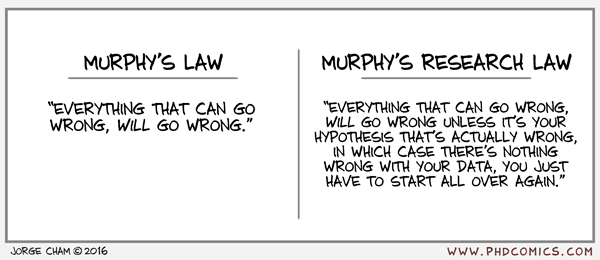
“Piled Higher and Deeper” by Jorge Cham
www.phdcomics.com
Still, exploring different projects is part of the grad school experience (or so I hear), and it was certainly an educational endeavor. Though more than a little frustrating at times, it did offer an insight into the life of a scientist: methods will fail, new ideas will emerge, projects will change, and in the end, you’ll find yourself arduously studying a subject you’d never even considered when you started. New grad students, be warned: until you finally defend your thesis/dissertation, you’re in for an academic rollercoaster ride!
4) Coauthoring is both easier and harder than writing alone.
Speaking as a writer who prefers to work solo, I’ve found there are advantages and disadvantages to collaborating with other authors on an article. On the one hand, different perspectives mean different ideas and contributions, which more often than not result in a well-rounded study and, consequently, a high-quality paper. On the other hand, opinions between authors can (and will) conflict during the writing process, which will make turning out the final draft all the more challenging.
As the lead author of a paper with five names to its title (and counting), I’m in charge of writing the text and integrating the other authors’ notes and revisions into each draft. The main advantage of this is that each researcher has their own area of expertise, so I’ve gotten plenty of help as much for the genetic part of the study as for the ecological part. However, some points in the discussion tend to have opposite approaches, and sure enough, I’ve rewritten some paragraphs a few times over after disagreements arose between my coauthors about how best to discuss the results.
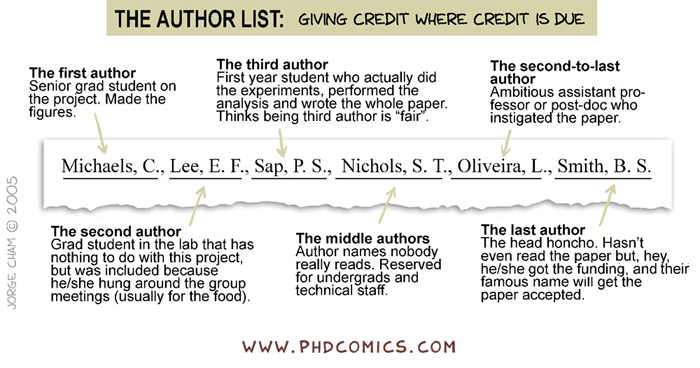
“Piled Higher and Deeper” by Jorge Cham
www.phdcomics.com
Finding a balance hasn’t always been easy, but since all my solo writing experience has been related to fiction, I’m glad to have so much extra input on this project. All that matters is that the final paper is worthy of publication!
5) Successfully completing and defending a thesis brings an incredible sense of accomplishment.
At the risk of sounding cheesy, words cannot describe the elation I felt while standing before the audience at my defense and thanking them for watching the presentation I had just concluded. In that moment, all my hard work, perseverance, and bouts of stress, anxiety, and tears had finally been validated. I was so proud of myself for having made it to that point that I smiled through the whole evaluation and Q&A segment that followed. It was one of the greatest successes of my life, and though it isn’t a bestselling novel, the thesis I toiled over for a year and a half will always hold a special place among my most treasured pieces of writing.
The only question now is whether this sense of achievement is enough motivation to take on double the hard work in pursuit of a doctorate…
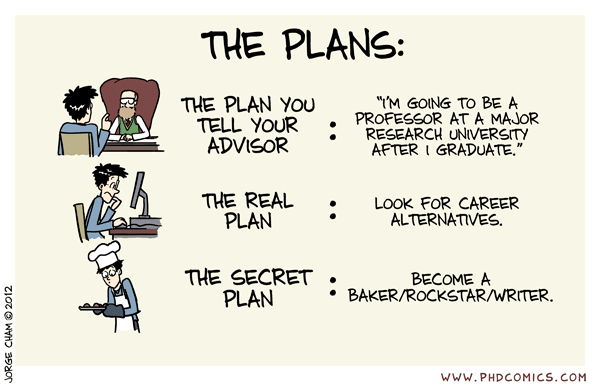
“Piled Higher and Deeper” by Jorge Cham
www.phdcomics.com
What about you? Do you have any college or grad school experiences to share? How have they influenced your writing?
All images in this post are from the comic series “Piled Higher and Deeper” (a.k.a. PHD Comics) by Jorge Cham; I own nothing! For a hilarious insight into life (or lack thereof) in academia, I highly recommend you check out his work!
by Naomi L. | October 5, 2016 | Blog, Creative Writing, Featured |
Welcome to the first week of October, or as it’s come to be known here on The Wolfe’s (Writing) Den, “Romeo & Juliet Week”! Yes, every year around this time, I like to share a post about my favorite love story: since I started blogging in 2013, I’ve covered five points that are commonly missed, the reasons this is such a great love story, and a book review of Romeo & Juliet / West Side Story.
Now I’d like to continue the trend this year with a post about some of the lessons we can all learn from Shakespeare’s timeless romance. So on that note, here are five lessons about love in Romeo & Juliet! Enjoy!
1) Love is blind.
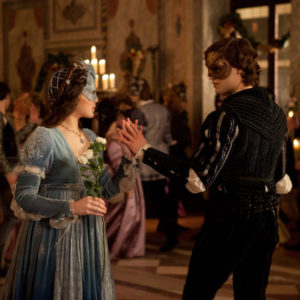
Romeo and Juliet meet at the Capulet Ball and fall in love at first sight (Romeo & Juliet, 2013)
This is arguably one of the most famous lessons taken from Romeo & Juliet (second to, if not tied with, the fourth point on this list). The city of Verona is torn by a feud between two influential households, “both alike in dignity”, yet against all odds, a pair of teenagers from either family find each other and fall in love at first sight. Initially blind to the fact they’re supposed to be enemies, they’re understandably shocked and disappointed after learning each other’s names, but still strive to be together in spite of the hatred that threatens to keep them apart.
Romeo and Juliet’s decision to set aside their differences in favor of romance proves true the famous idiom “love is blind”, and this has become a common theme in many adaptations. A well-known example is the musical West Side Story, in which a Polish-American boy and a Puerto-Rican girl fall in love against a backdrop of racial intolerance and street gang warfare. If there’s one lesson common to all versions of this story, it’s that love is and always will be universal. Be it in social position, race, or anything else, wherever fear and hatred create barriers, love will keep on tearing them down. Which goes to show…
2) Love brings out the best in us.
Too many people focus on the tragic themes in Romeo & Juliet without giving enough credit to the positive points. It’s easy to dismiss the title characters as naïve and misguided teenagers throughout this four-day course of events, but it’s important to keep in mind that they’re very different people by the end of the story than they were in the beginning.

Romeo and Juliet profess their love for each other over Juliet’s balcony (Romeo and Juliet, 1968)
Remember that before Romeo meets Juliet, he quite possibly suffers from depression due to perceived parental neglect and a hopeless infatuation with a young lady named Rosaline. Meanwhile, Juliet before Romeo is the picture of an innocent and sheltered child, pressured by her parents into a marriage of convenience with virtually no freedom to pursue happiness on her own. As I’ve noted before, Romeo & Juliet can be considered a coming-of-age story because after these teenagers cross paths, they quickly blossom into more mature people: Romeo becomes a deeply passionate and devoted lover, Juliet becomes a strong and confident woman, and both are willing to sacrifice everything for the love that makes them the best possible versions of themselves.
Now you may argue that Romeo wasn’t all good inside because he murdered Tybalt, but don’t forget that this act is brought about by his anger over Tybalt murdering his friend Mercutio and has nothing to do with Romeo’s marriage to Juliet. It’s hatred that brings out the worst in this story’s characters, while love only ever brings them happiness and hope for a peaceful future, at least to the ones who are willing to seek it.
Unfortunately, as these young lovers quickly learn, love has a tragic side as well…
3) Life without love is not worth living.
Our idealistic young heroes clearly believed their story was destined to last a lifetime, but sadly, as we all know, it was not to be. In the beginning of Act V, Romeo’s entire world is shattered when he learns that his beloved Juliet is dead (which we know is only part of Friar Laurence’s master plan, but this poor kid missed the memo). Heartbroken, it takes him about a second to decide his next course of action: to drink poison and die at his wife’s side.
Melodramatic, much? Not for someone in Romeo’s shoes. Don’t forget, in the course of a day, this teenage boy lost his best friend, his family, his home, and his social standing, and only narrowly escaped Verona with his life. Juliet was his last ray of hope, and now suddenly, she’s gone too. What else is a grieving young lover, with nothing left to live for, to do but follow his beloved into the afterlife?
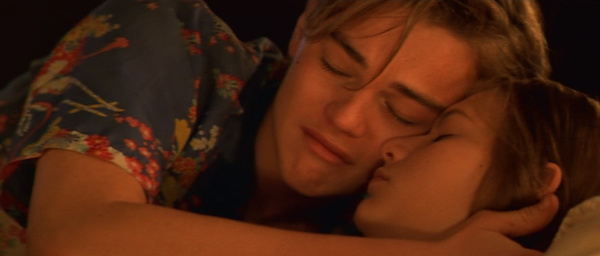
Romeo mistakenly believes Juliet is dead and resolves to die at her side (Romeo + Juliet, 1996)
Romeo’s decision to kill himself only after losing Juliet can be seen as a testament to how much she truly means to him. Even after losing everything else, he holds on to the hope of a future with her, and only gives up on life after that one hope is snatched away. Juliet, in turn, clearly loves Romeo just as deeply, as it also takes her literally a second to choose eternity in death with him over a miserable life alone. The star-crossed lovers are faced with an unthinkable choice in the play’s final scene, yet neither one of them hesitates to die for the other because they already know in their hearts the one truth no one else in the story seems to understand: life without love is not worth living.
Which leads us to the next lesson…
4) Love stories don’t always end happily.
Is there any tragedy in all of literature more famous than the plight of Shakespeare’s star-crossed lovers? Since premiering on stage just over four centuries ago, Romeo and Juliet have become the archetypal young lovers thwarted by fate, a symbol of romance doomed to a tragic end.
After learning of his wife’s supposed death, Romeo ventures into the Capulet tomb to say his final goodbye (“Eyes, look your last. / Arms, take your last embrace.” (5.3.112–13)) and die by Juliet’s side. Upon waking moments later and discovering her husband’s body, Juliet kisses him one last time and promptly plunges his dagger into her heart without a second thought (“O happy dagger, / This is thy sheath. There rust and let me die.” (5.3.169–70)). Fast forward to the Capulets and Montagues grieving for their dead children and the Prince chastising both families for leading these young lovers to their tragic end (“For never was a story of more woe / Than this of Juliet and her Romeo.” (5.3.309–10)).
As prolific readers and writers of romance well know, love stories don’t always end in “happily ever after”. Yet even tragic love stories can still drive home the most powerful message of all…
5) But in the end, love is still stronger than hate.
Romeo and Juliet may not have gotten their happy ending, but the love that compelled them to willingly die for each other still accomplished a miracle: it ended the generations-old feud between the Capulets and Montagues. This may seem like a consolation prize, but it’s still nothing to sneeze at; after all, not even the Prince of Verona could achieve peace between these families!
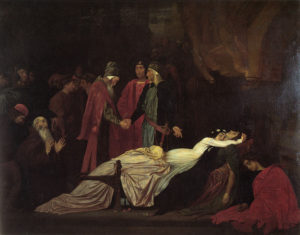
“The Reconciliation of the Montagues and Capulets over the Dead Bodies of Romeo and Juliet”, 1855, oil on canvas painting by Frederic Leighton
One of the central themes of Romeo & Juliet is passion, which manifests equally in love and in violence. Both are powerful and conflicting forces throughout the story, but ultimately, it’s love that conquers hate. To prove this point, compare the deaths of Romeo and Juliet to those of Mercutio and Tybalt. The latter pair engage in a heated duel and both end up suffering violent deaths brought on by anger and hatred; as a result, tensions between the Capulets and Montagues escalate and the feud only gets worse. In contrast, Romeo and Juliet, each the only child and last descendant of their respective families, willingly take their own lives in a final desperate act to escape the violent cycle keeping them apart and be united for eternity. Only then do Montague and Capulet realize their mistakes and make amends, for while they could easily blame Mercutio and Tybalt’s deaths on their enemies, they have no one to blame for Romeo and Juliet’s deaths but themselves.
Romeo & Juliet is one of the greatest love stories ever written, with strong lessons of romance that live on to this day. Whether proving that hatred kills or that love is the most powerful force in the world, Shakespeare’s classic play is a testament to the enduring passions of humanity, and it will always be my favorite story as much for the above lessons as for its ultimate message: life is fleeting, but love is forever.
What about you? What lessons do you think can be learned from Romeo & Juliet? What has this classic story taught you about love?
by Naomi L. | September 28, 2016 | Blog, Creative Writing |
I’ve made no secret of the fact that much of my inspiration for writing comes from my family. Some of that inspiration comes from observation while some of it comes directly from the lessons they teach me, and some of the best lessons I’ve ever learned came from my mother. She’s one of the wisest people I know, and many of her lessons have made their way as much into my personal life as into my stories. They say “write what you know”, and much of what I know about life comes from her!
So this week, I’d like to dedicate my creative writing post to my amazing role model and share three of my favorite lessons from her that inspire my stories. Enjoy, and thanks for the inspiration, Mom!
1) Marry someone with whom you share mutual love and respect.
 As I’ve mentioned a few times before, my parents are my greatest inspiration for romance. They talk about everything, laugh with each other often, and clearly love and respect each other immensely. That’s why most of the romantic relationships in my stories are between people who start out as friends and who would go to the ends of the Earth for one another. My mom clearly didn’t settle when it came to choosing her life partner because my dad does everything to make her happy and take care of their family. At the same time, he isn’t exactly the easiest person to live with, yet she always seems to know how to talk to him and what to say to keep him content (an art I’m still trying to master myself).
As I’ve mentioned a few times before, my parents are my greatest inspiration for romance. They talk about everything, laugh with each other often, and clearly love and respect each other immensely. That’s why most of the romantic relationships in my stories are between people who start out as friends and who would go to the ends of the Earth for one another. My mom clearly didn’t settle when it came to choosing her life partner because my dad does everything to make her happy and take care of their family. At the same time, he isn’t exactly the easiest person to live with, yet she always seems to know how to talk to him and what to say to keep him content (an art I’m still trying to master myself).
It’s this amazing balance that I try to practice in my personal life, as well as give my characters when I want to convey how much they really care for each other. True love is hard to find, so I’m lucky to have such excellent role models in my parents. One of the best lessons my mom taught me is that a woman should be loving and understanding, and should never settle for a partner who doesn’t appreciate how wonderful she is!
2) Being a mom is the hardest job in the world.
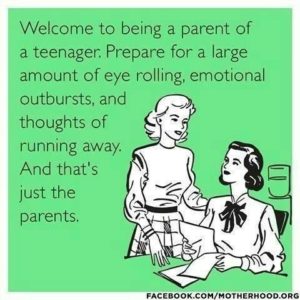 One of the qualities I admire most about my mom is how great she is at being a mother. She always took excellent care of me and my sisters, guiding us through life and protecting us from the dangers of the world while still giving us the freedom to develop our own personalities. Now as an adult taking on my own responsibilities, it’s become clear to me in hindsight how much my mother truly did to give us a happy childhood. Raising three daughters and running a household were definitely challenges in and of themselves, yet she always made them seem effortless. And on top of everything, I didn’t exactly make the job any easier for her when I was growing up. Let’s just say I went through some attitude issues in my early teens and she had to bear the brunt, always handling the situation with a level of patience that I couldn’t even dream of. I can only imagine the challenges that lie ahead if I ever become a mom!
One of the qualities I admire most about my mom is how great she is at being a mother. She always took excellent care of me and my sisters, guiding us through life and protecting us from the dangers of the world while still giving us the freedom to develop our own personalities. Now as an adult taking on my own responsibilities, it’s become clear to me in hindsight how much my mother truly did to give us a happy childhood. Raising three daughters and running a household were definitely challenges in and of themselves, yet she always made them seem effortless. And on top of everything, I didn’t exactly make the job any easier for her when I was growing up. Let’s just say I went through some attitude issues in my early teens and she had to bear the brunt, always handling the situation with a level of patience that I couldn’t even dream of. I can only imagine the challenges that lie ahead if I ever become a mom!
Whenever I write characters who are mothers, I try to keep in mind the difficulty of the job and imagine backstories for them full of the trials of raising children by drawing inspiration from everything my mother has done for her family. And not to speak too highly of how I think I turned out, but I believe she did a pretty great job!
3) There’s no relationship like the bond between and a mother and daughter!
I admit it: every time I watch Pixar’s Brave, it makes me want to hug my mother and tell her I’m sorry for everything I ever put her through. The story of Princess Merida and Queen Elinor is reminiscent of the relationship I had with my mom growing up: she taught me everything she could about being a lady, yet being a stubborn tomboy who mostly took after her father, I didn’t always see eye-to-eye with her. Still, I appreciate all her efforts to raise me into a “princess”, and while I often rebelled as a child, I understand now that she always had my best interests at heart and that she was the only one who could ever have taken on the task. As much as I’ve learned from my father and my sisters over the years, my relationship with my mother will always be special and unique!
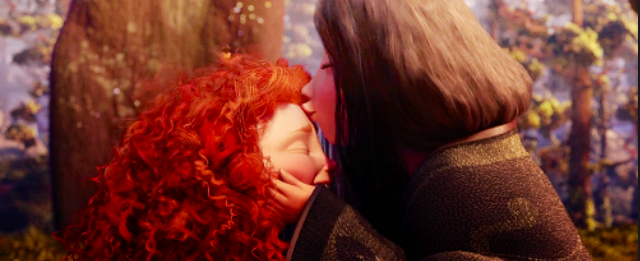
Princess Merida and her mother, Queen Elinor (Brave, 2012)
Much like how the story turns out for Merida and Elinor, I like to think my mom’s efforts did pay off in the end and that we have a great friendship today. No matter how many times we’ve argued in the past, my mother is still my greatest role model, and I can only hope that if I ever have a daughter of my own someday, I can be at least half the guardian, mentor, and inspiration to her as my mom is to me. For now, though, I’ll simply have to settle for modeling some of my characters after her and using her lessons as inspiration for my stories, both fictional and real life!
What about you? Have you ever drawn creative inspiration from your mother’s lessons? What sorts of stories or poetry has she inspired?
Today’s post is dedicated to my mother, whose love and lessons have always been a wonderful inspiration to me. Happy Birthday, Mom! I love you!
by Naomi L. | September 21, 2016 | Blog, Creative Writing |
Every morning, as part of my daily routine, I exercise my mind with the Elevate – Brain Training app. I tend to do well in most of the Writing games, but there is one that almost always trips me up no matter how many times I play it: Error Avoidance. In this game, you’re provided with a series of sentences, each containing two words that can easily be confused, and your goal is to fill the gauges on the screen by correctly choosing whether to swap the words or leave them as they are. I’ve played rounds of this game that lasted several minutes because I kept either mixing up the words I didn’t know or second-guessing the ones I did. It seems even for native speakers, English is a difficult and confusing language!
I’ve featured a list of 25 sets of easily confused words on my blog before, but playing Error Avoidance has inspired me to share some more. So for your reference, here are 25 more sets of easily confused words to watch out for in your writing. Enjoy!
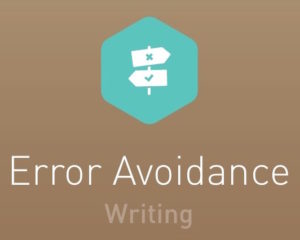 1) Abjure / Adjure – To “abjure” is to solemnly renounce a belief, cause, or claim. To “adjure” is to urge or request someone solemnly or earnestly to do something.
1) Abjure / Adjure – To “abjure” is to solemnly renounce a belief, cause, or claim. To “adjure” is to urge or request someone solemnly or earnestly to do something.
2) Abstruse / Obtuse – To be “abstruse” is to be difficult to understand. To be “obtuse” is to be slow to understand.
3) Allude / Elude – To “allude” to something is to call attention to it indirectly. To “elude” is to evade or escape from danger.
4) Amoral / Immoral – To be “amoral” is to lack a moral sense. To be “immoral” is to not conform to accepted standards of morality.
5) Amuse / Bemuse – To “amuse” is to entertain someone. To “bemuse” is to bewilder or confuse someone.
6) Appraise / Apprise – To “appraise” something is to assess its value or quality. To “apprise” is to inform someone.
7) Credible / Creditable / Credulous – To be “credible” is to be convincing or able to be believed. To be “creditable” is to be worthy of acknowledgment. To be “credulous” is to be too ready or willing to believe things.
8) Elegy / Eulogy – An “elegy” is a reflective poem, typically a lament for the dead. A “eulogy” is a speech of praise about someone who has recently died.
9) Emigrate / Immigrate – To “emigrate” is to permanently leave one’s home country. To “immigrate” is to move to a new country.
10) Endemic / Epidemic – To be “endemic” is to be exclusive to a particular area. An “epidemic” is a widespread occurrence of a disease or phenomenon.
11) Entomology / Etymology – “Entomology” is the study of insects. “Etymology” is the study of the origin of words.
12) Envelop / Envelope – To “envelop” is to wrap up or surround something completely. An “envelope” is a paper container used for holding letters.
13) Existent / Extant – To be “existent” is to be real. To be “extant” is to still be present.
14) Flaunt / Flout – To “flaunt” is to show off. To “flout” is to openly disregard the rules.
15) Flounder / Founder – To “flounder” is to struggle helplessly. To “founder” is to sink or fail.
16) Forbear / Forebear – To “forbear” is to refrain from doing something. A “forebear” is an ancestor.
17) Imply / Infer – To “imply” is to strongly suggest something. To “infer” is to draw a conclusion based on evidence and logic.
18) Inequality / Inequity – “Inequality” is a lack of equality. “Inequity” is a lack of fairness or justice.
19) Moral / Morale – To be “moral” is to be concerned with principles of right and wrong. “Morale” is the confidence and enthusiasm of a person or group of people.
20) Perpetrate / Perpetuate – To “perpetrate” is to commit a crime. To “perpetuate” is to make something continue indefinitely.
21) Persecute / Prosecute – To “persecute” is to treat someone unfairly, typically because of race, religion, or political views. To “prosecute” is to institute legal proceedings against someone.
22) Rational / Rationale – To be “rational” is to be in accordance with reason or logic. “Rationale” is a set of reasons or a logical basis for a course of action.
23) Sallow / Shallow – To be “sallow” is to have an unhealthy yellow or pale complexion. To be “shallow” is to lack depth.
24) Sanguine / Saturnine – To be “sanguine” is to be positive and optimistic. To be “saturnine” is to be slow and gloomy.
25) Upmost / Utmost – To be “upmost” is to be the highest. To be “utmost” is to be the greatest or most extreme.
What about you? Are there any words you often get mixed up? What other pairs or sets of words would you add to this list?
 1) Bail / Bale – “Bail” is the temporary release of an accused person awaiting trial. A “bale” is a tightly wrapped bundle of a material, such as hay or cotton.
1) Bail / Bale – “Bail” is the temporary release of an accused person awaiting trial. A “bale” is a tightly wrapped bundle of a material, such as hay or cotton.










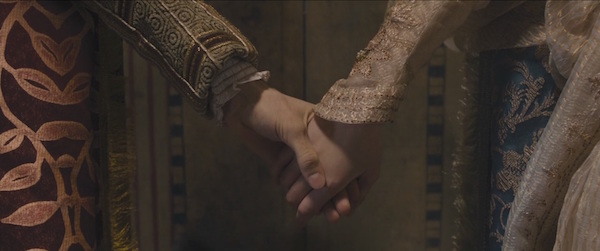
 As I’ve mentioned a few times before,
As I’ve mentioned a few times before,  One of the qualities I admire most about my mom is how great she is at being a mother. She always took excellent care of me and my sisters, guiding us through life and protecting us from the dangers of the world while still giving us the freedom to develop our own personalities. Now as an adult taking on my own responsibilities, it’s become clear to me in hindsight how much my mother truly did to give us a happy childhood. Raising three daughters and running a household were definitely challenges in and of themselves, yet she always made them seem effortless. And on top of everything, I didn’t exactly make the job any easier for her when I was growing up. Let’s just say I went through some attitude issues in my early teens and she had to bear the brunt, always handling the situation with a level of patience that I couldn’t even dream of. I can only imagine the challenges that lie ahead if I ever become a mom!
One of the qualities I admire most about my mom is how great she is at being a mother. She always took excellent care of me and my sisters, guiding us through life and protecting us from the dangers of the world while still giving us the freedom to develop our own personalities. Now as an adult taking on my own responsibilities, it’s become clear to me in hindsight how much my mother truly did to give us a happy childhood. Raising three daughters and running a household were definitely challenges in and of themselves, yet she always made them seem effortless. And on top of everything, I didn’t exactly make the job any easier for her when I was growing up. Let’s just say I went through some attitude issues in my early teens and she had to bear the brunt, always handling the situation with a level of patience that I couldn’t even dream of. I can only imagine the challenges that lie ahead if I ever become a mom!


Recent Comments